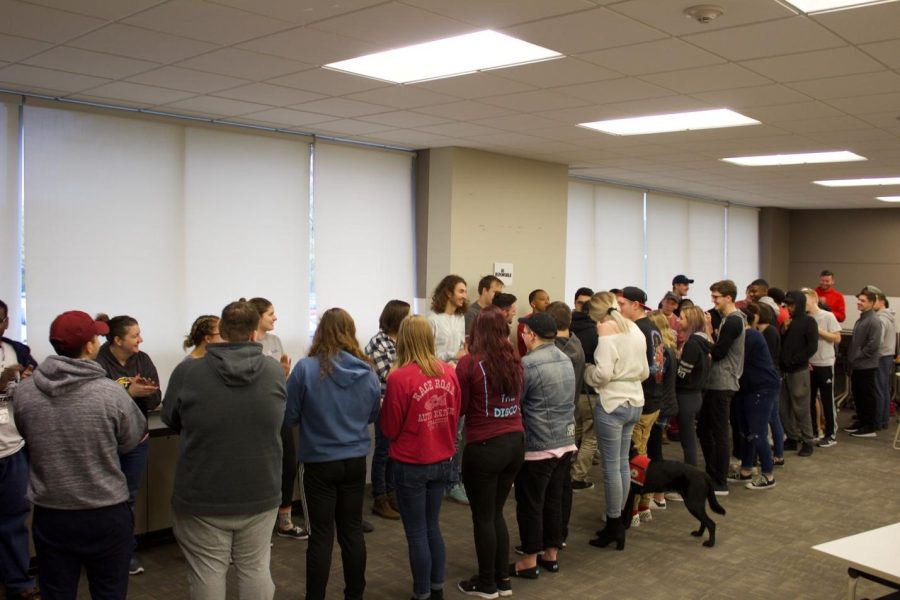Green Dot has biggest turnout yet for last workshop of semester
A group of participants take part in a training exercise during the Green Dot Workshop on Saturday, Nov. 3, 2018.
November 4, 2018
Green Dot hosted its final violence prevention workshop in Studio A at Twin Towers Center Saturday. Full tables of 60 eager minds learned how to prevent violence on Kent State’s campus.
The six hour workshop comprised a mix of engaging activities, anonymous questionnaires and real life scenario role plays. The main purpose of the workshop was to educate people on how to see the early warning signs of power-based physical violence and what they can do as a bystander to prevent violence from happening. The specific focus is on stalking, relationship violence and sexual violence.
Of the 60 participants, 76 percent said they know someone who had an act of power-based physical violence against them. Fifty-two percent of participants said an act of violence was committed against themselves.
Green Dot works to educate people so they have the knowledge and skills to put an end to violence. Sara Donato, a senior digital media production major, said, “it is really important to know the warning signs and for individuals to be able to walk out of here today with more knowledge on the topic.”
A majority of students who attended the training workshop showed passion toward being a part of the solution to end violence. However, the bystander effect was a very real thing and people can often feel discouraged to intervene in situations. The workshop focused a lot on how to be an active bystander and how to bypass barriers one might have when it comes to helping someone in need.
For Margaret Straub, a sophomore applied conflict management major, being an active bystander means “being able to recognize a situation and determining the best way to address it.”
Sven Rundman, the project coordinator for Green Dot, refers to “the 3 D’s” when it comes to overcoming the bystander effect and addressing a situation. The 3 D’s include direct, distract and delegate.
Direct means actively approaching the situation and addressing the abuse. Distract means doing or saying anything to distract someone enough to discontinue the abusive behavior. Delegate means letting someone else know about it so they can possibly intervene.
Sven expressed how this workshop “gives everybody the tools to participate in this culture change.”
Green Dot came to Kent State’s campus in 2014 and rapidly grew since. According to Sven, “the Green Dot movement has taken a life of its own.” Green Dot has been working with the Undergraduate Student Government and Greek Life community in order to remain on the forefront of preventing violence.
Kent State’s Alpha Tau Omega fraternity chapter partnered with Green Dot in October to learn about ways to end sexual violence. Jaret Shannon, a member of the fraternity, expressed on Twitter that “safety on campus shouldn’t be something you have to work for, it should be something that is understood and respected.”
During the workshop, the participants created a soapbox statement and shared them amongst the group. Some of the most powerful ones included, “I believe if everyone works together and becomes educated through Green Dot, we can make our campus a safer place,” and “I believe that victims should not feel like they are alone.”
Green Dot was founded by Dorothy Edwards and Green Dot is active on more than 300 campuses nationwide. You can read more about Green Dot and what it is here.
Kent State’s Green Dot program is housed within the Williamson House at Sexual and Relationship Violence Support Services (SRVSS). SRVSS specializes in providing services for those who have been affected by violence at any point in their lives.
The Green Dot saying is “No one has to do everything, but everyone has to do something.”
If you or anyone you know have been effected by violence, you can reach out to SRVSS at (330) 672-8016 or you can email them at [email protected]
In cases of emergency, always call 911.
Madeline Pigott is the mental health and social services reporter. Contact her at [email protected].

























